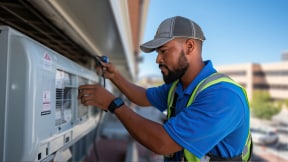Can I get FAFSA® if I’m Homeless?

Senior Associate, JPMorgan Chase

If you’re an unaccompanied homeless youth or an unaccompanied youth who’s self-supporting and at risk of becoming homeless, you can still file the Free Application for Federal Student Aid (FAFSA®) to see if you’re eligible for federal financial aid.
As far as what to expect, on the 2024-25 FAFSA®, you’ll be asked a question to determine whether or not a government agency or program, a nonprofit, or another source, has determined that you’re a youth who’s unaccompanied (not in the physical custody of a legal parent or guardian) and homeless (lacking a fixed, regular, and adequate nighttime residence) or unaccompanied, self-supporting, and at risk of homelessness. If you answer “Yes,” you’ll be asked if you have an unaccompanied homeless youth determination from one of the eligible authorities (more on this below).
If you have a determination from one of the authorized entities, you can submit it to your financial aid administrator at the college or career school you plan to attend. The financial aid administrator must accept this determination unless there’s specific conflicting information. If you can’t provide an unaccompanied homeless youth determination from one of the approved entities, there are additional steps to consider taking.
If you’re experiencing homelessness with your parents or a legal guardian, meaning you aren’t unaccompanied, you won’t answer “Yes” to the homeless question on the FAFSA®. Instead, you’ll fill out the FAFSA® as instructed, including information about your parents or legal guardian. If this describes your situation, you may want to reach out to your financial aid administrator to let them know you’re homeless (but not unaccompanied) because there might be additional resources, funding, or programs for which you’re eligible.
Those who file the FAFSA® as an independent student due to a homeless youth determination will have their status carried forward if their situation remains unchanged and they remain enrolled in the same school.
Students in this situation may need to affirm this status. Still, institutions are restricted from delaying or preventing awarding and disbursing federal student aid if this is the case. They also can’t require students to submit additional documentation unless the institution has conflicting information that it needs to resolve.
Continue reading for answers to common questions about filing the FAFSA® if you’re homeless or at risk of becoming homeless.
Common FAQs about filing FAFSA® if you’re homeless
How do you prove you’re homeless (for purposes of the FAFSA®)?
There are a few ways to provide proof per Federal Student Aid (FSA). That proof is sometimes referred to as a homeless youth determination. Below is the list of individuals who can provide determinations:
- Your high school or school district’s homeless liaison or their designee
- The director or designee of an emergency or transitional shelter, street outreach program, homeless youth drop-in center, or any other program that serves individuals experiencing homelessness
- The director or designee of a Federal TRIO or GEAR UP Program
- The financial aid administrator at a student’s current institution or at another institution that previously made a determination
Determinations can be a documented phone call, written statement, or a letter. Once you’ve obtained the proper documentation, submit it to your institution’s financial aid office. Financial aid administrators must consider and accept this documentation and must not ask for additional documentation unless there’s specific conflicting information.
Do you need to prove you’re homeless (for purposes of the FAFSA®)?
If you’ve indicated that you have a determination of homelessness from one of the authorized entities, your institution may ask to see that determination or to talk to the entity who made the determination.
If you don't have a determination from one of the authorized parties, it’s the responsibility of your financial aid administrator to make a determination based on a written statement or a documented interview.
Per federal guidance, financial aid administrators must make a determination for youth who are unable to get determinations from other entities.
If you’re homeless but accompanied (in the physical custody of a legal parent or guardian), you don’t need to prove your status as you won’t answer “Yes” to the homeless question on the FAFSA®.
What happens if I can’t provide proof of homelessness?
If you can’t obtain a determination from one of the individuals above, you’ll need to work with your college's financial aid office and request a homeless youth determination.
The financial aid office must make this determination based on a documented interview or a written statement. Although it’s not required for you to help the financial aid office administrator make a homeless youth determination, per the Department of Education, you may consider submitting documentation from any of the entities below:
- Local school district personnel
- High school or college counselors
- State homeless education coordinators
- The National Center for Homeless Education (NCHE)
- Third parties such as private or publicly funded homeless shelters and service providers
- Mental health professionals, social workers, mentors, doctors, or clergy
Per federal guidance, financial aid administrators must make a determination for youth who are unable to get determinations from other entities. These determinations may be supported by definitions of being homeless and unaccompanied contained in the McKinney–Vento Homeless Assistance Act of 1987.
Do you need to provide a home address on the FAFSA®?
No, students claiming they’re homeless on the FAFSA® aren’t required to provide a home address, but they’ll need to provide a mailing address where they can receive mail.
If this applies to you, the address you provide should be reliable, such as a family member’s house, a friend’s house, a P.O. Box, or a homeless shelter, and you should be able to check it often. Just be sure to get permission to use the mailing address you supply. If you find permanent housing, make sure to update the address on your FAFSA®.
For homeless students currently enrolled in college and looking to fill out the FAFSA® for the next school year, using your college mailing address is acceptable as long as you get permission and instructions from the school on how to receive your FAFSA® through the school’s mail system.
What if you can’t provide your parents’ income information on the FAFSA®?
You might have an unusual circumstance in which you don’t meet the definition of an unaccompanied homeless youth or an unaccompanied youth at risk of homelessness and self-supporting, but you still can’t provide parental information on the FAFSA®. If that’s the case, you might qualify as a provisional independent student. As a provisional independent student, you should reach out to your financial aid administrator and explain your unusual circumstance and see if you can request a dependency override.
It’s important to note that unaccompanied homeless youth determinations are different and distinct from a provisional independent status with a dependency override and should be treated as such.
Additional resources for homeless students applying to college
If you’re currently in high school and an unaccompanied homeless youth or an unaccompanied youth who’s self-supporting and at risk of becoming homeless, you have a McKinney-Vento liaison who’s required to connect you with available resources. Additionally, some colleges have homeless student liaisons or support programs dedicated to supporting homeless youth. Some states have laws in place to support college students experiencing homelessness.
If you’re homeless and applying to college, know that help is available. The U.S. Department of Education has published an online guide for youth in the foster care system who are transitioning to adulthood. It also provides helpful information for homeless youth who’ve never been in foster care. A big part of the guide is about accessing educational opportunities.
Other resources to explore include:
- The National Center for Homeless Education (NCHE)
- The National Association for the Education of Homeless Children and Youth (NAEHCY)
- The U.S. Department of Housing and Urban Development (HUD)
Final thoughts
If you’re an unaccompanied homeless youth, you may be eligible to receive federal student aid, and there are resources in place to support your journey to higher education. Keep this in mind as you pursue education opportunities.



